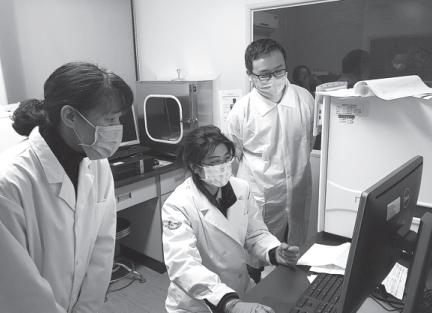'Virus detective' confident of team cracking case

 Zheng Xukun (center) discusses test results with colleagues at the Center for Disease Control and Prevention in Enshi Tujia and Miao autonomous prefecture in Hubei province. XINHUA
Zheng Xukun (center) discusses test results with colleagues at the Center for Disease Control and Prevention in Enshi Tujia and Miao autonomous prefecture in Hubei province. XINHUA
TIANJIN-At 10 pm one chilly evening, 26-year-old Zheng Xukun, protected head-to-toe by a hazmat suit together with an N95 mask, a pair of medical goggles, latex gloves and waterproof protective boots, was still busy detecting nucleic acid of the novel coronavirus.
Zheng is one of the "virus detectives" working at the Center for Disease Control and Prevention in Enshi Tujia and Miao autonomous prefecture in Central China's Hubei province, the hardest-hit by the coronavirus epidemic.
Zheng has been working as a CDC laboratory technician for three years in North China's Tianjin city, responsible for detecting more than 1,000 samples of flu-like throat swabs and 100 samples of measles and rubella every year.
"I am working with the virus every day," she says, smiling.
On Feb 1, she volunteered to go to Enshi, about 1,500 kilometers from her hometown, to aid local colleagues in nucleic acid detection in the hard-hit region.
Zheng still remembers the day when she arrived in the virus-hit city with another three technicians. "It was a rainy, cold morning. Local staff prepared cotton-padded shoes for us. They are not the most fashionable, but they are warm."
Nucleic acid detection has been the most important method to screen the latent virus in the body of a patient since the outbreak, but it was not as easy as people thought. The workload of sample testing was beyond Zheng's imagination.




































